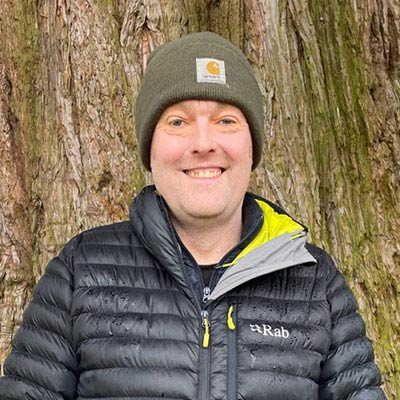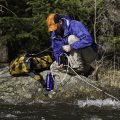Last Updated on July 21, 2023 by Dean Anderson
Planning a camping trip but feeling completely lost when it comes to choosing a water filter?
There’s a lot to consider when looking for the safest, cheapest, and most convenient water purification method, and we’re here to help.
This comprehensive guide will take all the guesswork out of picking the best filter for your trip. That means that you can focus on having fun – without risking any nasty bugs.
We’ll be explaining the differences between filters and purifiers, the pros and cons of different types of filter, and the best options for different kinds of trip.
Ready to become an expert on choosing the right water filter for camping?
Let’s do this.
Water Filters vs. Water Purifiers
Unsure about the difference between water filters and water purifiers?
In a nutshell, water filters remove sediment, debris, and bacteria from water, making them ideal if the water you want to drink is a little cloudy but otherwise clean.
However, most water filters won’t remove viruses from your water, since they’re even smaller than bacteria.
If you think that viruses could be present in your water, you’ll need to use a water purifier instead – these use chemicals or UV light to remove pollutants.
Water purifiers can leave an unpleasant taste behind, but that’s better than ingesting dangerous, dirty water. Purifiers can also run out quickly, unlike most filters which you can reuse again and again.
So, now that you know the basic differences, let’s go in for a deeper dive on the different types of water filter for camping.
Filter Bottles
Filter bottles are a popular choice for their convenience and ease of use.
You’ll fill the bottle with water, which will then be automatically filtered as it passes through the straw or mouthpiece.
It’s quick and easy, but no good if you want to filter large amounts of water for a big group. You’ll also need consistent access to water to refill the bottle, as it won’t hold much.
So, filter bottles are a good option for a solo camper with easy access to water throughout their trip, but not great for large groups or trails without regular water access.
Pump Filters
A pump filter is a handy piece of kit made up of a manual pump and a hose.
You’ll place the end of the hose into the body of water you want to pump from, connect to a container of your choice, then pump using your hand.
This is a fast way to fill multiple containers with clean water, and there’s no need to worry about running out of batteries or fuel. They’re suitable for groups or individuals and aren’t too heavy to carry, perfect for backpacking.
Pump filters can break or become blocked, however, so be aware that you may need a backup option. If this device appeals take a look at our recent reviews.
Gravity Filters
Are you traveling with a large group? Then a gravity filter is probably your best option.
You’ll fill a bag with water, then hang from a tree or pole. The water slowly filters down, requiring no effort on your part, until you have a container of clean drinking water.
Gravity filters are ideal if you don’t want to spend hours pumping, and they’re light and easy to carry. The speed of filtration may vary from filter to filter, so be sure to check reviews before you buy.
You’ll also need to keep track of which bag is clean and which is dirty, and clean the filter periodically to keep it working properly.
Need a low-effort water filter for camping? Gravity filters are a good choice.
Tablet and Drop Purifiers
Realized that you need a purifier rather than a filter?
Tablet and chemical drop purifiers are probably the options that come to mind first.
They’re light, easy to transport and work effectively. Even if you don’t think you need purifiers, it’s worth throwing a few into your pack – they take up very little space, and it’s better to be safe than sorry.
Tablets and drops need to be left in your water for a set amount of time, usually around 20 minutes, before it’s safe to drink. Be sure to account for this and follow instructions carefully.
Some chemical treatments can leave your water tasting unpleasant, although that doesn’t mean it’s unsafe to drink.
Once you’re out of chemical purifiers, you’ll need another way to get clean water, so be sure to pack more than you need.
UV Light Purifiers
Want to invest in a high-tech water purifying solution?
Then a UV light purifier could be for you.
UV purifiers work by emitting a stream of high-intensity UV light into your water, which prevents viruses, bacteria, and other organisms from multiplying. Although they might still be present in the water, they’re no longer harmful.
UV purifiers are highly-effective and easy to use, but they only work in relatively clear water.
If you’re looking to purify water which is cloudy or contains a lot of sediment, you’ll need to run it through a filter first, which takes extra time.
UV light purifiers are battery-operated, so there is a risk that you’ll run out of power. They also contain delicate bulbs which can shatter if not packed and transported carefully.
Overall, UV purifiers are a good option, but it’s smart to keep a few tablets or drop in your pack, just in case something goes wrong.
How to Choose the Best Water Filter for Camping
Are you ready to choose the perfect water filter for camping?
You’ll need to decide whether you need a filter or purifier, consider how much water you’ll need to filter at once, how quickly you want to filter it, how easy your access to water will be, and which filter will be easiest to transport.
Make a list of your major requirements and compare them to the list above, and you’ll soon have your answer.
Don’t be afraid to experiment with a few different methods, especially if you’re new to camping.
Want more insider tips for your next camping trip? Hike on over here.

Eight years ago, I took a risk and left a miserable office job to follow a lifestyle career that involved my love for the great outdoors. I’ve taken my love for camping, hiking and travel to the next level by running my small campground with a friend near Portland, Oregon. It’s for way less money but this has truly been a dream come true and the running involves lots of family and friends.
The next evolution of that was to get online and start allcampingstuff.com. At our campground, I spend a lot of time setting up camping equipment for customers and disposing of the garbage products they leave behind. If I can help just a few people with advice on good camping gear, then this website venture will be worth it.
So, if you want to avoid the duds and spend your money wisely you’ve hopefully come to the right place.








